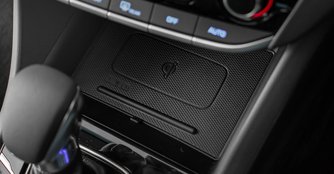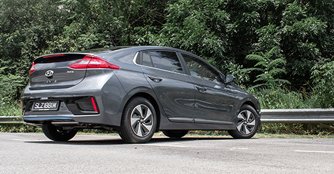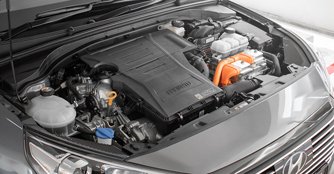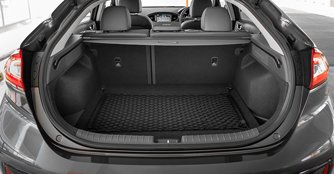Hyundai Ioniq Hybrid 1.6 GLS Sunroof (A) Facelift Review
29 May 2018|18,062 views
Facelift (What's New)
New maintenance-free lithium-ion module in the alternator management system
Upgraded battery system
More fuel efficient
$10,000 rebate until July
While many Governments are financially incentivising the adoption of electrified powertrains, whether hybrid, plug-in hybrid of fully electric, it's strange to think that the Hyundai Ioniq Hybrid was slapped with a $10,000 tax surcharge when the Vehicle Emissions Scheme (VES) kicked in earlier this year.
Previously, under the now defunct Carbon Emissions-Based Vehicle Scheme, the Ioniq Hybrid enjoyed a $30,000 rebate, as did its rival the Toyota Prius.
To find a solution around this absurdity, local Hyundai distributor Komoco Motors went as far as to work with Hyundai Motor Company to re-engineer the 2018 Ioniq Hybrid.
Did they succeed?
Yes and quite beautifully, indeed.
Incorporating Hyundai Smart Stream technology, a new maintenance-free lithium-ion module in the alternator management system and an upgrade of the battery system, the Ioniq Hybrid is back in the green.
The result of the tweaking is a weight reduction of 12kg, reduced engine loads, lower emissions and improved fuel economy.
Compared to the previous car we tested that clocked 18.2km/L, the updated model achieved a rather astounding 25.4km/L, with nearly half of the journey done on highways.
More importantly, buyers who are considering one will be glad to know that currently, the Ioniq Hybrid benefits from a $10,000 tax rebate.
However, come 1 July when a revision to the VES takes effect, only fully electric cars, which are costlier and in limited supply, will qualify for the top-tier rebate of $20,000.
Previously, under the now defunct Carbon Emissions-Based Vehicle Scheme, the Ioniq Hybrid enjoyed a $30,000 rebate, as did its rival the Toyota Prius.
To find a solution around this absurdity, local Hyundai distributor Komoco Motors went as far as to work with Hyundai Motor Company to re-engineer the 2018 Ioniq Hybrid.
Did they succeed?
Yes and quite beautifully, indeed.
Incorporating Hyundai Smart Stream technology, a new maintenance-free lithium-ion module in the alternator management system and an upgrade of the battery system, the Ioniq Hybrid is back in the green.
The result of the tweaking is a weight reduction of 12kg, reduced engine loads, lower emissions and improved fuel economy.
Compared to the previous car we tested that clocked 18.2km/L, the updated model achieved a rather astounding 25.4km/L, with nearly half of the journey done on highways.
More importantly, buyers who are considering one will be glad to know that currently, the Ioniq Hybrid benefits from a $10,000 tax rebate.
However, come 1 July when a revision to the VES takes effect, only fully electric cars, which are costlier and in limited supply, will qualify for the top-tier rebate of $20,000.
What about the other parts of the car?
There are also improvements to the management system of the petrol engine but like before, combined output remains at 139bhp and 147Nm of torque, and at low speeds the car is able to drive on electric juice only.

 The Ioniq is richly appointed with modern amenities such as the wireless charging system you see here
The Ioniq is richly appointed with modern amenities such as the wireless charging system you see here
Paired to a dual-clutch tranny, power delivery is creamy, cog swops are quick and there's a lot more fun to be had than in the CVT-equipped Prius.
In fact, where overall driving experience is concerned, the Ioniq Hybrid even displays the sort of chuckability often associated with sportier sedans and hatchbacks, thanks to a well-sorted suspension setup and taut chassis.
Elsewhere, the story is pretty much the same but that's not a bad thing at all. Like its fully electric sibling, its interior is clean and functional, doing without the typically spacey designs of other electrified cars.
And with an electric driver's and ventilated front seats, ample room for four and a 443-litre boot, the Ioniq Hybrid is just as family-friendly as it is eco-friendly.
So it's good for the Earth, family and wallet?
At $114,888 (as of 23 May 2018), inclusive of the prevailing $10,000 rebate, it's undoubtedly great value compared to the $40,000 more expensive but less powerful Prius.
If you're considering the switch to a hybrid, now's a good time before the Government pulls the plug on their rebates once more come July.
There are also improvements to the management system of the petrol engine but like before, combined output remains at 139bhp and 147Nm of torque, and at low speeds the car is able to drive on electric juice only.

Paired to a dual-clutch tranny, power delivery is creamy, cog swops are quick and there's a lot more fun to be had than in the CVT-equipped Prius.
In fact, where overall driving experience is concerned, the Ioniq Hybrid even displays the sort of chuckability often associated with sportier sedans and hatchbacks, thanks to a well-sorted suspension setup and taut chassis.
Elsewhere, the story is pretty much the same but that's not a bad thing at all. Like its fully electric sibling, its interior is clean and functional, doing without the typically spacey designs of other electrified cars.
And with an electric driver's and ventilated front seats, ample room for four and a 443-litre boot, the Ioniq Hybrid is just as family-friendly as it is eco-friendly.
So it's good for the Earth, family and wallet?
At $114,888 (as of 23 May 2018), inclusive of the prevailing $10,000 rebate, it's undoubtedly great value compared to the $40,000 more expensive but less powerful Prius.
If you're considering the switch to a hybrid, now's a good time before the Government pulls the plug on their rebates once more come July.
Facelift (What's New)
New maintenance-free lithium-ion module in the alternator management system
Upgraded battery system
More fuel efficient
$10,000 rebate until July
While many Governments are financially incentivising the adoption of electrified powertrains, whether hybrid, plug-in hybrid of fully electric, it's strange to think that the Hyundai Ioniq Hybrid was slapped with a $10,000 tax surcharge when the Vehicle Emissions Scheme (VES) kicked in earlier this year.
Previously, under the now defunct Carbon Emissions-Based Vehicle Scheme, the Ioniq Hybrid enjoyed a $30,000 rebate, as did its rival the Toyota Prius.
To find a solution around this absurdity, local Hyundai distributor Komoco Motors went as far as to work with Hyundai Motor Company to re-engineer the 2018 Ioniq Hybrid.
Did they succeed?
Yes and quite beautifully, indeed.
Incorporating Hyundai Smart Stream technology, a new maintenance-free lithium-ion module in the alternator management system and an upgrade of the battery system, the Ioniq Hybrid is back in the green.
The result of the tweaking is a weight reduction of 12kg, reduced engine loads, lower emissions and improved fuel economy.
Compared to the previous car we tested that clocked 18.2km/L, the updated model achieved a rather astounding 25.4km/L, with nearly half of the journey done on highways.
More importantly, buyers who are considering one will be glad to know that currently, the Ioniq Hybrid benefits from a $10,000 tax rebate.
However, come 1 July when a revision to the VES takes effect, only fully electric cars, which are costlier and in limited supply, will qualify for the top-tier rebate of $20,000.
Previously, under the now defunct Carbon Emissions-Based Vehicle Scheme, the Ioniq Hybrid enjoyed a $30,000 rebate, as did its rival the Toyota Prius.
To find a solution around this absurdity, local Hyundai distributor Komoco Motors went as far as to work with Hyundai Motor Company to re-engineer the 2018 Ioniq Hybrid.
Did they succeed?
Yes and quite beautifully, indeed.
Incorporating Hyundai Smart Stream technology, a new maintenance-free lithium-ion module in the alternator management system and an upgrade of the battery system, the Ioniq Hybrid is back in the green.
The result of the tweaking is a weight reduction of 12kg, reduced engine loads, lower emissions and improved fuel economy.
Compared to the previous car we tested that clocked 18.2km/L, the updated model achieved a rather astounding 25.4km/L, with nearly half of the journey done on highways.
More importantly, buyers who are considering one will be glad to know that currently, the Ioniq Hybrid benefits from a $10,000 tax rebate.
However, come 1 July when a revision to the VES takes effect, only fully electric cars, which are costlier and in limited supply, will qualify for the top-tier rebate of $20,000.
What about the other parts of the car?
There are also improvements to the management system of the petrol engine but like before, combined output remains at 139bhp and 147Nm of torque, and at low speeds the car is able to drive on electric juice only.

 The Ioniq is richly appointed with modern amenities such as the wireless charging system you see herePaired to a dual-clutch tranny, power delivery is creamy, cog swops are quick and there's a lot more fun to be had than in the CVT-equipped Prius.
The Ioniq is richly appointed with modern amenities such as the wireless charging system you see herePaired to a dual-clutch tranny, power delivery is creamy, cog swops are quick and there's a lot more fun to be had than in the CVT-equipped Prius.
In fact, where overall driving experience is concerned, the Ioniq Hybrid even displays the sort of chuckability often associated with sportier sedans and hatchbacks, thanks to a well-sorted suspension setup and taut chassis.
Elsewhere, the story is pretty much the same but that's not a bad thing at all. Like its fully electric sibling, its interior is clean and functional, doing without the typically spacey designs of other electrified cars.
And with an electric driver's and ventilated front seats, ample room for four and a 443-litre boot, the Ioniq Hybrid is just as family-friendly as it is eco-friendly.
So it's good for the Earth, family and wallet?
At $114,888 (as of 23 May 2018), inclusive of the prevailing $10,000 rebate, it's undoubtedly great value compared to the $40,000 more expensive but less powerful Prius.
If you're considering the switch to a hybrid, now's a good time before the Government pulls the plug on their rebates once more come July.
There are also improvements to the management system of the petrol engine but like before, combined output remains at 139bhp and 147Nm of torque, and at low speeds the car is able to drive on electric juice only.

In fact, where overall driving experience is concerned, the Ioniq Hybrid even displays the sort of chuckability often associated with sportier sedans and hatchbacks, thanks to a well-sorted suspension setup and taut chassis.
Elsewhere, the story is pretty much the same but that's not a bad thing at all. Like its fully electric sibling, its interior is clean and functional, doing without the typically spacey designs of other electrified cars.
And with an electric driver's and ventilated front seats, ample room for four and a 443-litre boot, the Ioniq Hybrid is just as family-friendly as it is eco-friendly.
So it's good for the Earth, family and wallet?
At $114,888 (as of 23 May 2018), inclusive of the prevailing $10,000 rebate, it's undoubtedly great value compared to the $40,000 more expensive but less powerful Prius.
If you're considering the switch to a hybrid, now's a good time before the Government pulls the plug on their rebates once more come July.
Also read our comparison article on:
Hyundai Ioniq Hybrid 1.6 GLS vs Toyota Prius Hybrid 1.8Car Information
Hyundai Ioniq Hybrid 1.6 GLS Sunroof (A)
CAT B|Petrol-Electric|26.3km/L
Horsepower
104kW (139 bhp)
Torque
147 Nm
Acceleration
11.1sec (0-100km /hr)
This model is no longer being sold by local distributor
All Used Hyundai Ioniq HybridThank You For Your Subscription.










































